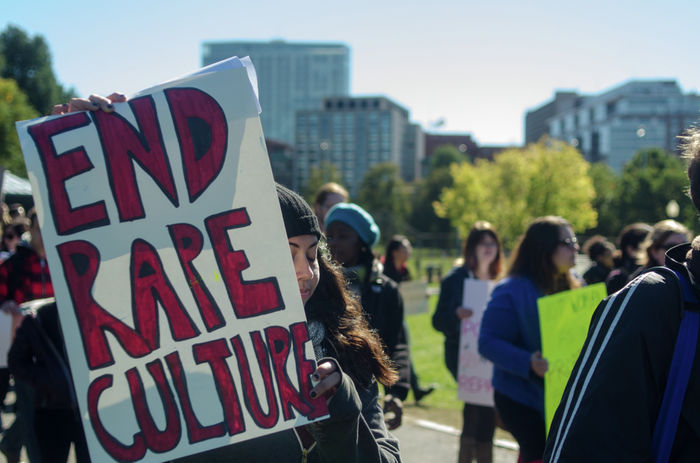“Girls night in”: why are university students taking on the spiking epidemic themselves?
Meg Byrom examines the depressing continuation of gender-based violence, discussing increased spiking incidents, “girls night in” boycotts and apparent inaction of governing bodies

For many young people the re-opening of clubs, the prospect of nights out, and freedom to sit in a pub with a group bigger than 6 felt like a reconciliation with adolescence. The 18 months of Covid-19 restrictions severed students from their “university experience” and undergraduate memories with their peers. Winter terms have begun with students returning in droves to local towns and cities to get a taste of “real” student life. However, the cathartic release of a night out with friends has quickly been halted by disturbing stories and statistics of rampant spiking, and a new tactic of gender-based violence involving students being injected with drugs.
“The onus of protection and safety falls upon students”
After the tragic murders of both Sarah Everard and Sabina Nessa this year, gendered violence has recentered itself in mainstream public conversation. Young women in particular are having to ask themselves how do I truly stay safe if danger seems to arise from every corner, whether simply walking home, or on a midweek night out with friends? Across the UK, the “Girls Night In” boycott intends to put pressure on nightclubs and the service sector to improve safety standards so those at risk of gender-based violence can be safe. Many of these grassroots student boycotts want intensive training for staff on dealing with drug-related first aid, better CCTV, background checks on staff and drink testing facilities, amongst other calls for change. Whilst the boycott planned to commence in the last week of October may see students empowering themselves — much like the “reclaim the night” protests — it seems that yet again the onus of protection and safety falls upon students. From using safety covers on drinks to organising boycotts, these heavy burdens are emotionally exhausting and traumatic. Whilst young students plan to tackle gender-based violence and misogyny-fuelled crimes, what can universities do to protect us?
On the whole, universities across the country have been slow to react to the spiking crisis, only beginning to comment on the issue long after terms began in September. The epidemic of sexual and gender-based violence have unravelled; when universities do react, the advice has been largely superficial and reinforced victim-blaming rhetoric. Durham University’s handling of the crisis has illuminated such an issue, as their own student wellbeing team advised “don’t get spiked” to its students.
“ “We lift each other up and support one another. But, we shouldn’t have to scream so loudly for things to change” ”
Isabella Taylor, one organiser of Cambridge’s boycott, reasserted that universities have been slow to act, suggesting apparent ignorance and denial of the issue at hand. After seeing posts circulating around social media that reinforced victim-blaming and put pressure on vulnerable students to protect themselves, the organisers joined the plethora of other university boycotts to enact change in Cambridge. “I wish sometimes people at the top would have the initiative to reform sooner and not need to be told what needs to be done” Taylor commented, “There is amazing solidarity amongst everyone who campaigns in this way though, and we lift each other up and support one another. But, we shouldn’t have to scream so loudly for things to change.” Taylor added, “The student body has been incredible. The Women + Nonbinary officers from the college JCRs have been doing so much work to campaign for safety but also support victims in their colleges. The SU has also been great. Hawks and Ospreys did huge amounts of work to coordinate with two of the main clubs in Cambridge to bring in measures. There is a real feeling that people want and are willing to fight for change.”
But for student organisers, the boycott represents once again that it is bottom-up endeavours doing a lot of the heavy lifting to address sexual and gender-based violence in universities. Though spiking may take place in nightclubs and bars, universities have a duty of care to protect and ensure the safety of all students whether threats and issues occur on or off-campus. With The Tab, reporting that 70% of Cambridge students feel worried about the spiking epidemic, it shouldn’t take a student boycott to highlight the extent of this problem — but it has. Misogyny-fuelled violence is not being tackled fast or effectively enough and universities need to step up to the challenge, addressing these problems before they spiral. Whether this ranges from providing holistic support for survivors, or educational campaigns on sexual health, safety and consent throughout the terms, with a problem as dangerous, traumatic and life-altering as spiking, universities cannot wait to be taught by their students before they dare to act.
 News / Cambridge student numbers fall amid nationwide decline14 April 2025
News / Cambridge student numbers fall amid nationwide decline14 April 2025 News / Greenwich House occupiers miss deadline to respond to University legal action15 April 2025
News / Greenwich House occupiers miss deadline to respond to University legal action15 April 2025 Comment / The Cambridge workload prioritises quantity over quality 16 April 2025
Comment / The Cambridge workload prioritises quantity over quality 16 April 2025 Features / The TikTok college: using social media in access and outreach15 April 2025
Features / The TikTok college: using social media in access and outreach15 April 2025 Sport / Cambridge celebrate clean sweep at Boat Race 202514 April 2025
Sport / Cambridge celebrate clean sweep at Boat Race 202514 April 2025







